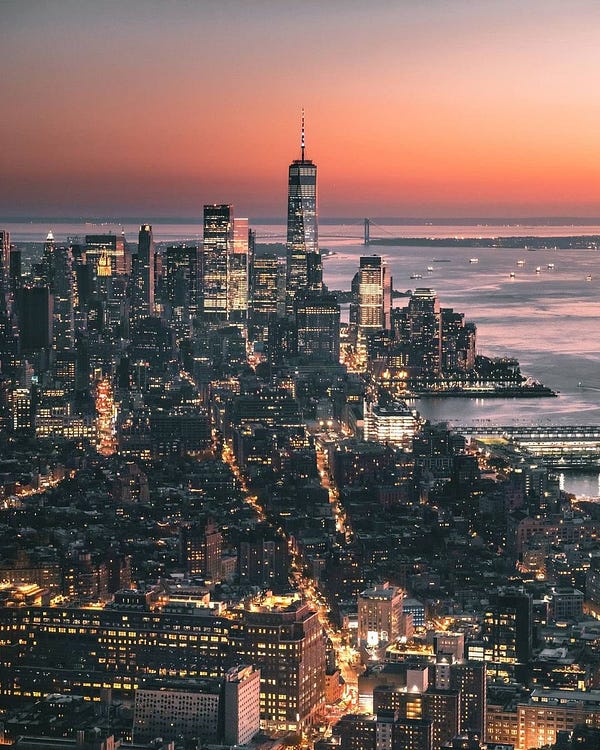Tech is Politics
#5 edition - 16.01.2021
Welcome to the summarin - a weekly newsletter summarizing the most important stories and conversations you need to know from the week covering tech, media, and commerce. Every week I collect the most interesting developments and Twitter conversations you should pay attention to.
Shuffle through this playlist while reading your brief.
If you enjoy this format, tell a friend. The more, the merrier.
Editor’s note: The conversation around Big Tech and its influence on politics is not news. Last year already, prominent voices started to raise their concerns about the ever-growing dominance of tech over media, institutions, and competition. Regulators started to pay attention. Now, after the dynamic start of 2021, issues around moderation, privacy, and state control over social media have entered the mainstream.
Deplatforming the US president and Parler, a social media company, creates a precedent for Big Tech to remove any individual or company they deem in breach of their own rules. The trading of political influence can result in the silencing of critical voices and opponents. Competitors can be dealt with by simply flipping a switch, preventing them from using the resources needed to run their business.
Meanwhile, on the other side of the world, China is solidifying its position as a leader in markets that have largely been neglected by the Big Tech players from the West. The Chinese consumer’s habits and tastes are going global. The tables have flipped and western companies are now following, rather than leading their Chinese counterparts, especially in areas such as retail and social. In addition, lawmakers in the West should pay close attention to how the country is dealing with antitrust regulation.
Tech and politics now go hand in hand. If we barely used to care about politics, we are going to care a lot more in the future.
News:
Former Google CEO predicts the internet will split in two — and one part will be led by China (CNBC)
”I think the most likely scenario now is not a splintering, but rather a bifurcation into a Chinese-led internet and a non-Chinese internet led by America.” Eric Schmidt
The rise of Chinese technology companies and the country’s focus on expanding its influence in Europe, Africa, the Middle East, and Asia (Belt Road Initiative) is creating an eco-system that has different rules to those we are used to in the West. On the surface, everything will look similar, but once you dig deeper, you’ll uncover differences led by political and philosophical ideologies. Read storyWhy retailers everywhere should look to China (Economist)
Online retail experiences in China differ significantly from what we are used to in Europe and the US. But this is changing rapidly as the Chinese consumer’s tastes and habits are going global. It is now Facebook and co’s turn to copy features that have become popular in the East. The adoption of technology is not the only thing leading to the transformation and positioning of China as a leading internet power. Recent moves by the country’s antitrust body show a glimpse of what tech regulation can look like in Europe and the US, where controlling Big Tech has been a futile attempt to this day. Read storyBig Tech Is Now a Shadow Government (Maker)
The events of last week in the US capital and the following suspension of the US president’s social media accounts shed light on the influence Big Tech has on politics. Tech is politics. Controlling the flow of information, these companies, driven by profits, are in a position to shape society, dictate narratives, and amplify division among people at scale. With a new administration taking the reigns soon, regulating Big Tech will be high on its agenda. Will tech’s influence be strong enough to resist calls for increased moderation and accountability? Read storyApple, Google, and Amazon Web Services Pull Support for Parler (Emerging Tech Brew)
The far-reaching influence of Big Tech was made obvious by the total incineration of Parler, which bills itself as “non-biased, free speech social media focused on protecting user’s rights.” First, Apple and Google removed the app from their app stores and later Amazon removed the app from its cloud services platform AWS. How much of this was driven by internal rules and how much of it was trying to appease a new US administration that is likely to look at regulating the industry? Read story
Tweets:







That’s a wrap. See you next week.
Marin
P.S. If you enjoyed this week’s edition of summarin and don’t want to miss out on the next one, subscribe here.
And if you know someone who will enjoy this format and will benefit from staying in the know, share it with them.
P.P.S. I read all these publications and articles because of two reasons: 1) I have a passion and interest in the topics covered, and 2) I am the co-founder of DULO and it is my responsibility to learn to become a better operator and keep an eye on where the world is going, so I can help my company grow with the times. It would mean the world to me if you check out our site and send me some feedback :) Thank you!





